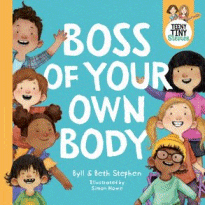
Boss of Your Own Body
Boss of Your Own Body
Byll & Beth Stephen
Simon Howe
ABC Books, 2021
24pp., hbk., RRP $A19.99
9780733341724
You’re not the boss of many things
because you’re little and still learning.
You’re not the boss of anyone else,
you’ve got to let them be themselves.
But you ARE the boss of one thing …
How often have you heard a little one say, “You’re not the boss of me” as they try to exert some power over a situation? From birth it is instinctive that we feel in control but as a young child, there are few circumstances that we do have the power to make the decisions. In this book, based on a song from Teeny Tiny Stevies, sisters who “make content for children filled with cheerful folk-pop tunes covering topics that explore important social messages in a fun and relatable manner.” young children are encouraged to understand that while they are not in charge of many everyday situations, they are in charge of their own bodies. They decide how fast they can run, whether they do a handstand, join a game or hold a grown-up’s hand.
As a teacher of 50+ years, I’ve attended many staff meetings and other PL but I always remember one particular meeting in 1989 when we were presented with the appalling statistics relating to child abuse including that based on these, there had to be kids within our school, indeed our classes, who were suffering and school had to be both their sanctuary and their saviour. It came as mandatory reporting laws became some of the first introduced after the ACT was granted self-government and for many, eyes were opened as we learned the facts and figures and what we could and must do about any instances we became aware of. In many ways it was a turning point for the teaching profession as suddenly our role legally embraced the pastoral care of our students as well as their academic development. Programs like Protective Behaviours were introduced (who remembers Try Again, Little Red Riding Hood?) and we tried to negotiate both teaching the children how to protect themselves and the minefield that was the legal obligations we now had, particularly as children now had both a pathway and a voice so they felt it was safe and worthwhile to disclose.
And while organisations like A Mighty Girl have produced booklists that focus on abuse and violence , only a handful are for primary-aged students and even fewer for preschool. So this book fills a gap in what is available to our young readers, sadly having to teach them something they shouldn’t really have to learn. Even though its words only touch lightly on the possibility of intimate abuse – “You see, you can give your uncle a kiss and you can decide to snuggle like this” – it is that repeated message that the child can choose that is the critical and powerful one. Unlike the animated version which features cartoon creatures, Simon Howe has chosen to interpret this with illustrations of children from diverse backgrounds so even the youngest child can relate to the words and the message. This is something written just for them.
Ugly, sad and necessary though it may be that we have to teach our littlies this message which will eventually build into the No Means No campaign is a vital one so to have such a sensitive but appealing text to add to the armoury is very welcome.
&
